Social Work Interventions in Early Diagnosed Dementia
Added on 2023-01-07
46 Pages19223 Words92 Views
SOCIAL WORK
INTERVENTIONS IN
EARLY DIAGNOSED
DEMENTIA
INTERVENTIONS IN
EARLY DIAGNOSED
DEMENTIA
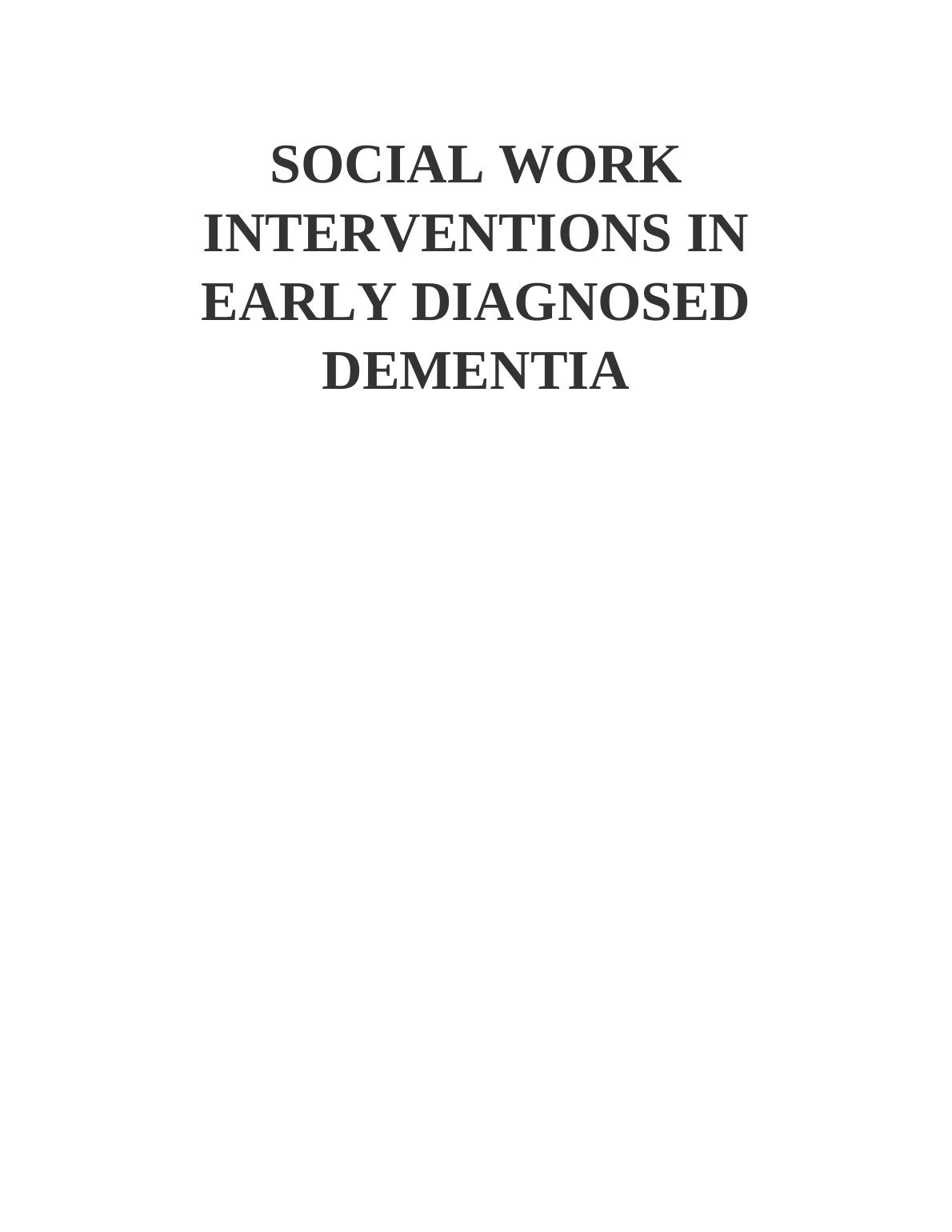
ABSTRACT
Dementia cannot be considered as a specific disease, it is basically that disease in which at-
least two brain parts or functions does not work properly. In this there are various signs and
symptoms that can be seen in patient which can reduce the quality of life of patients. Various
interventions can be used by health care professionals and workers such as social care service
can be used. In this the patients who have been suffering from dementia can also face challenges
in completing the familiar task. Patient with dementia can also face problem related to
communication, they might forget the normal terms or even might don’t know how to
communicate it. This can reduce their health outcome and also can affect their well being. It is
being advised that the social care intervention needs to be provided to patient at an early stage so
that quality of patients can be improved. It has also been analysed that dementia is mostly caused
to the people of old age and the risk related to get dementia increased with the age. It has also
been analysed that there are various legal frame works that has been made related to dementia. It
has been advised and suggested to health care workers that they need to be involved in following
all these legal frameworks so that health outcome of patient can be improved in an ethical and
legal way. This will also assist in enhancing quality of life of patients who are been suffering
from dementia. It has also been analysed from the report that therapeutic interventions can be
provided to people who are been suffering from dementia. In this care workers are been involved
in giving training related to skills so that patients can perform their personal task independently
to improve their health outcome.
Dementia cannot be considered as a specific disease, it is basically that disease in which at-
least two brain parts or functions does not work properly. In this there are various signs and
symptoms that can be seen in patient which can reduce the quality of life of patients. Various
interventions can be used by health care professionals and workers such as social care service
can be used. In this the patients who have been suffering from dementia can also face challenges
in completing the familiar task. Patient with dementia can also face problem related to
communication, they might forget the normal terms or even might don’t know how to
communicate it. This can reduce their health outcome and also can affect their well being. It is
being advised that the social care intervention needs to be provided to patient at an early stage so
that quality of patients can be improved. It has also been analysed that dementia is mostly caused
to the people of old age and the risk related to get dementia increased with the age. It has also
been analysed that there are various legal frame works that has been made related to dementia. It
has been advised and suggested to health care workers that they need to be involved in following
all these legal frameworks so that health outcome of patient can be improved in an ethical and
legal way. This will also assist in enhancing quality of life of patients who are been suffering
from dementia. It has also been analysed from the report that therapeutic interventions can be
provided to people who are been suffering from dementia. In this care workers are been involved
in giving training related to skills so that patients can perform their personal task independently
to improve their health outcome.
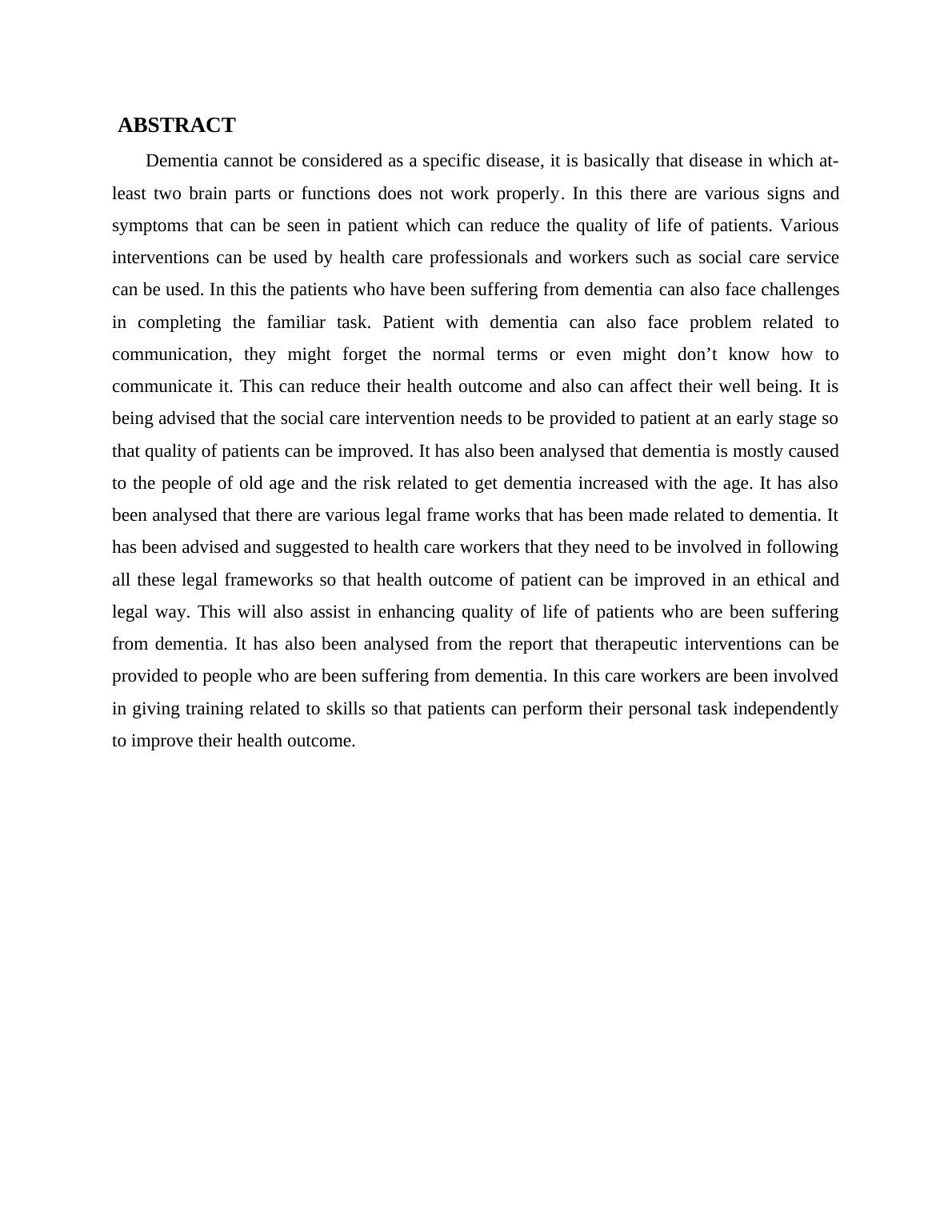
TABLE OF CONTENTS
ABSTRACT....................................................................................................................................2
INTRODUCTION...........................................................................................................................1
Aim:.............................................................................................................................................3
Objectives:...................................................................................................................................4
Research question:.......................................................................................................................4
POLICY AND LEGISLATIVE FRAMEWORK...........................................................................5
METHODOLOGY..........................................................................................................................9
LITERATURE REVIEW..............................................................................................................13
DISCUSSION OF FINDINGS......................................................................................................23
IMPLICATIONS...........................................................................................................................30
CONCLUSION AND RECOMMENDATIONS..........................................................................33
REFERENCES..............................................................................................................................38
ABSTRACT....................................................................................................................................2
INTRODUCTION...........................................................................................................................1
Aim:.............................................................................................................................................3
Objectives:...................................................................................................................................4
Research question:.......................................................................................................................4
POLICY AND LEGISLATIVE FRAMEWORK...........................................................................5
METHODOLOGY..........................................................................................................................9
LITERATURE REVIEW..............................................................................................................13
DISCUSSION OF FINDINGS......................................................................................................23
IMPLICATIONS...........................................................................................................................30
CONCLUSION AND RECOMMENDATIONS..........................................................................33
REFERENCES..............................................................................................................................38

Research topic: Social Work Interventions in Early Diagnosed Dementia
INTRODUCTION
Social service interventions also may include concrete services such as income support or
material aid, institutional placement, mental health services, in-home health services,
supervision, education, transportation, housing, medical services, legal services, in-home
assistance, socialization, nutrition. These services are being provided in order to enhance health
outcome of patient and also to increase their quality of life. It has been analysed that patients
who are been suffering from dementia needs to be provided with health care services at an early
stage so that the problem does not grow and also this will assist in enhancing quality of life of
individual. It has been analysed that the population that has been diagnosed with the dementia in
United Kingdom is been increasing day by day. Currently, the number of people in the UK with
Dementia has risen to 850,000.
Dementia cannot be considered as a specific disease, it is basically that disease in which at-
least two brain parts or functions does not work properly. In this patient can face impairment of
at-least two brain functions and thus reducing down their quality of life. Patients who are been
suffering from dementia medication and therapy can be provided to them in order to enhance
their health outcome (Mosk and et.al., 2017). Signs and symptoms related to disease can include
forgetfulness, limited social skills and reducing in the ability to think. This disease can cause
problems in the daily functioning of human body and reducing the ability of patients to perform
certain task. There are seven critical stages of dementia which can start from mild forgetfulness.
There is certain different type of dementia in which Alzheimer’s is the most common one. In this
there are cognitive decline which can be faced by patients who are been suffering from dementia.
It has also been analysed that in United Kingdom the cases related to dementia is been
increasing. It has also been analysed that the disease needs to be diagnosed at an early stage so
that evidence based social intervention can be provided to patients in order to enhance their
health outcome. A person who is suffering from dementia can forget things easily and might can
also face problem in remembering the things.
Patient lose their capacity to manage their day to day task and requires assistance of
someone else, so this can make an individual’s condition adverse. So it is being advised to health
care professionals that they need to be engaged in diagnosing dementia at an early stage. It has
also been evaluated that in final stage of dementia supervision can also be provided at home; the
1
INTRODUCTION
Social service interventions also may include concrete services such as income support or
material aid, institutional placement, mental health services, in-home health services,
supervision, education, transportation, housing, medical services, legal services, in-home
assistance, socialization, nutrition. These services are being provided in order to enhance health
outcome of patient and also to increase their quality of life. It has been analysed that patients
who are been suffering from dementia needs to be provided with health care services at an early
stage so that the problem does not grow and also this will assist in enhancing quality of life of
individual. It has been analysed that the population that has been diagnosed with the dementia in
United Kingdom is been increasing day by day. Currently, the number of people in the UK with
Dementia has risen to 850,000.
Dementia cannot be considered as a specific disease, it is basically that disease in which at-
least two brain parts or functions does not work properly. In this patient can face impairment of
at-least two brain functions and thus reducing down their quality of life. Patients who are been
suffering from dementia medication and therapy can be provided to them in order to enhance
their health outcome (Mosk and et.al., 2017). Signs and symptoms related to disease can include
forgetfulness, limited social skills and reducing in the ability to think. This disease can cause
problems in the daily functioning of human body and reducing the ability of patients to perform
certain task. There are seven critical stages of dementia which can start from mild forgetfulness.
There is certain different type of dementia in which Alzheimer’s is the most common one. In this
there are cognitive decline which can be faced by patients who are been suffering from dementia.
It has also been analysed that in United Kingdom the cases related to dementia is been
increasing. It has also been analysed that the disease needs to be diagnosed at an early stage so
that evidence based social intervention can be provided to patients in order to enhance their
health outcome. A person who is suffering from dementia can forget things easily and might can
also face problem in remembering the things.
Patient lose their capacity to manage their day to day task and requires assistance of
someone else, so this can make an individual’s condition adverse. So it is being advised to health
care professionals that they need to be engaged in diagnosing dementia at an early stage. It has
also been evaluated that in final stage of dementia supervision can also be provided at home; the
1
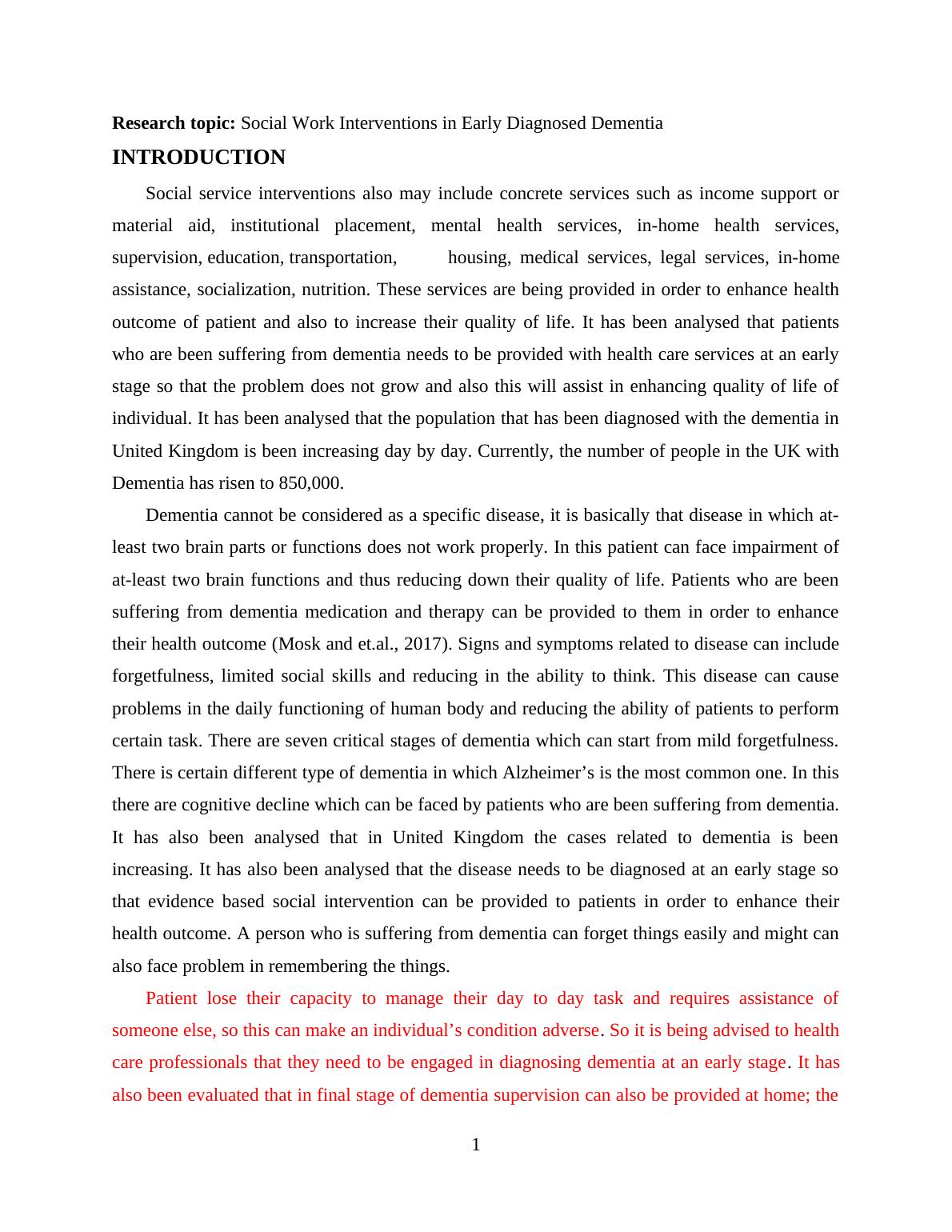
patients may need support in doing the basic functions related to daily life. It has been analysed
that there are chances that patient do not survive the lasts stage. It has also increased the
mortality rate. Dementia is not a single disease in general; it is basically description of symptoms
such as impairment of memory, communication and thinking (Carrion and et.al., 2018). All these
cognitive decline can reduce down quality of life of an individual and also the patient’s health
outcome can also be decreased because of it. It has been evaluated that likelihood of suffering
from dementia mostly increases with age. In United Kingdom the greater number of people who
are suffering from dementia are of above the age of 65.
Alzheimer’s accounts for 60-80 percent of all cases of dementia. It has also been estimated
that there are around 47.5 million cases of dementia worldwide, so it can be said that so many
number of people are suffering from this chronic disease. This problem is generally faced by
older people but is not been considered as a part of aging. There are various signs and symptoms
that can be seen in patient who has been suffering from dementia and mostly the reason behind it
is memory loss (Hartman and et.al., 2018). It has also been analysed that some symptoms related
to dementia can be noticed by the patient itself and other can be noticed by care workers or
health care professionals. So of the common symptoms of dementia can include frequent
memory loss. In this patient can be involved in asking the same questions again and again. They
can also face challenges in completing the familiar task. Patient with dementia can also face
problem related to communication, they might forget the normal terms or even might don’t know
how to communicate it. Patient can have difficulty in language. Patients with dementia can also
lose the ability related to abstract thinking and can also face issues related to diss-orientation. It
means that they can be even lost in the familiar streets.
They can also suffer from sudden mood changes or patient can also have mood swings. So
all these signs and symptoms can have reduced down the health outcome of patient and they
might find it difficult in doing even the normal task. Patient with dementia can also be more
aggressive and the changes in their behaviour can also be seen. They can also stop taking
initiatives to do certain task, thus making them more depressed and sadder. It is being suggested
to health care professionals that they need to be involved in identifying all these signs and
symptoms at early stage so that well-being and quality of life of patient is been improved. In
order to enhance health outcome of patient various interventions needs to be used so that health
outcome of patient suffering from dementia can be improved. It has also been analysed that there
2
that there are chances that patient do not survive the lasts stage. It has also increased the
mortality rate. Dementia is not a single disease in general; it is basically description of symptoms
such as impairment of memory, communication and thinking (Carrion and et.al., 2018). All these
cognitive decline can reduce down quality of life of an individual and also the patient’s health
outcome can also be decreased because of it. It has been evaluated that likelihood of suffering
from dementia mostly increases with age. In United Kingdom the greater number of people who
are suffering from dementia are of above the age of 65.
Alzheimer’s accounts for 60-80 percent of all cases of dementia. It has also been estimated
that there are around 47.5 million cases of dementia worldwide, so it can be said that so many
number of people are suffering from this chronic disease. This problem is generally faced by
older people but is not been considered as a part of aging. There are various signs and symptoms
that can be seen in patient who has been suffering from dementia and mostly the reason behind it
is memory loss (Hartman and et.al., 2018). It has also been analysed that some symptoms related
to dementia can be noticed by the patient itself and other can be noticed by care workers or
health care professionals. So of the common symptoms of dementia can include frequent
memory loss. In this patient can be involved in asking the same questions again and again. They
can also face challenges in completing the familiar task. Patient with dementia can also face
problem related to communication, they might forget the normal terms or even might don’t know
how to communicate it. Patient can have difficulty in language. Patients with dementia can also
lose the ability related to abstract thinking and can also face issues related to diss-orientation. It
means that they can be even lost in the familiar streets.
They can also suffer from sudden mood changes or patient can also have mood swings. So
all these signs and symptoms can have reduced down the health outcome of patient and they
might find it difficult in doing even the normal task. Patient with dementia can also be more
aggressive and the changes in their behaviour can also be seen. They can also stop taking
initiatives to do certain task, thus making them more depressed and sadder. It is being suggested
to health care professionals that they need to be involved in identifying all these signs and
symptoms at early stage so that well-being and quality of life of patient is been improved. In
order to enhance health outcome of patient various interventions needs to be used so that health
outcome of patient suffering from dementia can be improved. It has also been analysed that there
2
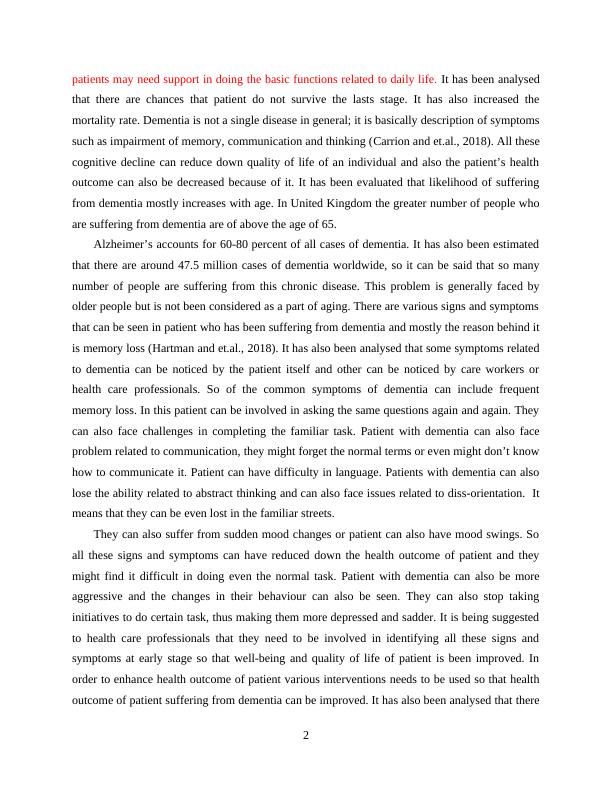
are various types of dementia. The most common one is Alzheimer’s disease. In this type of
disease, the brain size of patients shrinks. They also face problem related to thinking and can
frequently forgot the things. The other type of problem that can be faced by patient is dementia
with lewy bodies. In this there are changes in brain and it reduces down the ability of patients to
think. The other type of dementia that has been faced by patient is mixed dementia. In this
people can also suffer from Alzheimer and they can also face problem related to ventricular
dementia at the same time. Patient can also face problem related to Parkinson’s disease.
This can be marked by the presence of Lewy bodies. This disease can also lead to the signs
and symptoms of dementia and thus reducing down the quality of life of individuals who are
been suffering from it (Koyama and et.al., 2017). The early signs and symptoms of dementia can
include forgetfulness, changes in mood, problem in communication, loss in appetite,
aggressiveness, language problems and many more. All these can reduce down the health and
well-being of patient who is been suffering from it. In this, social care intervention can be
provided to patients at an early stage so that their health outcome can be improved and also their
health and wellbeing can also be enhanced. It has also been analysed that there are certain causes
of dementia, the most common cause is that there are chances that brain cell of patients has been
dead and because of this they have been suffering from the problem of dementia. Patient can also
suffer from brain injury as post traumatic dementia is mainly cause by the head or brain injury.
In Alzheimer’s progressive brain cells have been died and thus reducing downs the health
outcome of patients. In social intervention assistance can be provided by care workers at home
and also they can be involved in providing patients with education and knowledge related to
disease so that dementia can be diagnosed at an early stage (Zhang And et.al., 2017). It has also
been analysed that there is various legal framework that has been made for the patients who have
been suffering from dementia, so social care worker and health care professional needs to be
involved in following legal framework. Present report will lay emphasis on the legal framework
used for patients. It will also lay focus on the methodology that has been selected to increase
knowledge related to subject matter. Assignment will also focus on the literature review,
highlighting the need for such a study. It will also lay emphasis on discussion and findings.
Aim:
To explore the effectiveness of intervention methods used by social workers in practice
when supporting adults with dementia in the early stages of their diagnosis.
3
disease, the brain size of patients shrinks. They also face problem related to thinking and can
frequently forgot the things. The other type of problem that can be faced by patient is dementia
with lewy bodies. In this there are changes in brain and it reduces down the ability of patients to
think. The other type of dementia that has been faced by patient is mixed dementia. In this
people can also suffer from Alzheimer and they can also face problem related to ventricular
dementia at the same time. Patient can also face problem related to Parkinson’s disease.
This can be marked by the presence of Lewy bodies. This disease can also lead to the signs
and symptoms of dementia and thus reducing down the quality of life of individuals who are
been suffering from it (Koyama and et.al., 2017). The early signs and symptoms of dementia can
include forgetfulness, changes in mood, problem in communication, loss in appetite,
aggressiveness, language problems and many more. All these can reduce down the health and
well-being of patient who is been suffering from it. In this, social care intervention can be
provided to patients at an early stage so that their health outcome can be improved and also their
health and wellbeing can also be enhanced. It has also been analysed that there are certain causes
of dementia, the most common cause is that there are chances that brain cell of patients has been
dead and because of this they have been suffering from the problem of dementia. Patient can also
suffer from brain injury as post traumatic dementia is mainly cause by the head or brain injury.
In Alzheimer’s progressive brain cells have been died and thus reducing downs the health
outcome of patients. In social intervention assistance can be provided by care workers at home
and also they can be involved in providing patients with education and knowledge related to
disease so that dementia can be diagnosed at an early stage (Zhang And et.al., 2017). It has also
been analysed that there is various legal framework that has been made for the patients who have
been suffering from dementia, so social care worker and health care professional needs to be
involved in following legal framework. Present report will lay emphasis on the legal framework
used for patients. It will also lay focus on the methodology that has been selected to increase
knowledge related to subject matter. Assignment will also focus on the literature review,
highlighting the need for such a study. It will also lay emphasis on discussion and findings.
Aim:
To explore the effectiveness of intervention methods used by social workers in practice
when supporting adults with dementia in the early stages of their diagnosis.
3
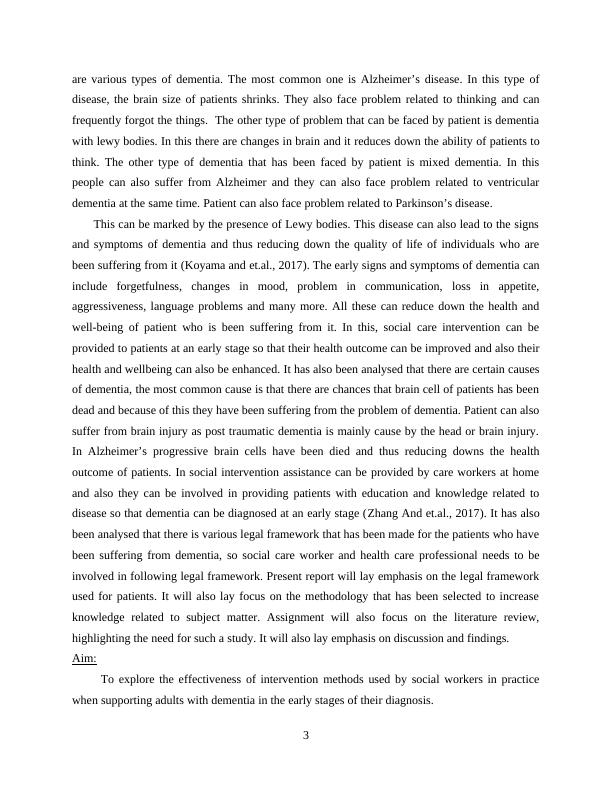
Objectives:
Identify current interventions used to manage and delay the progression of Dementia.
To uncover what obstacles adults with Dementia face in the early stages of diagnosis.
To identify the issues that social workers experience when providing care plans for adults
with Dementia.
Research question:
What are the concerns of social workers when working with adults with Dementia?
What social work intervention strategies are used to delay the progression of Dementia?
What are the lived experiences of early diagnosed adults with Dementia?
What obstacles do social workers experience in providing support for adults with
Dementia?
4
Identify current interventions used to manage and delay the progression of Dementia.
To uncover what obstacles adults with Dementia face in the early stages of diagnosis.
To identify the issues that social workers experience when providing care plans for adults
with Dementia.
Research question:
What are the concerns of social workers when working with adults with Dementia?
What social work intervention strategies are used to delay the progression of Dementia?
What are the lived experiences of early diagnosed adults with Dementia?
What obstacles do social workers experience in providing support for adults with
Dementia?
4
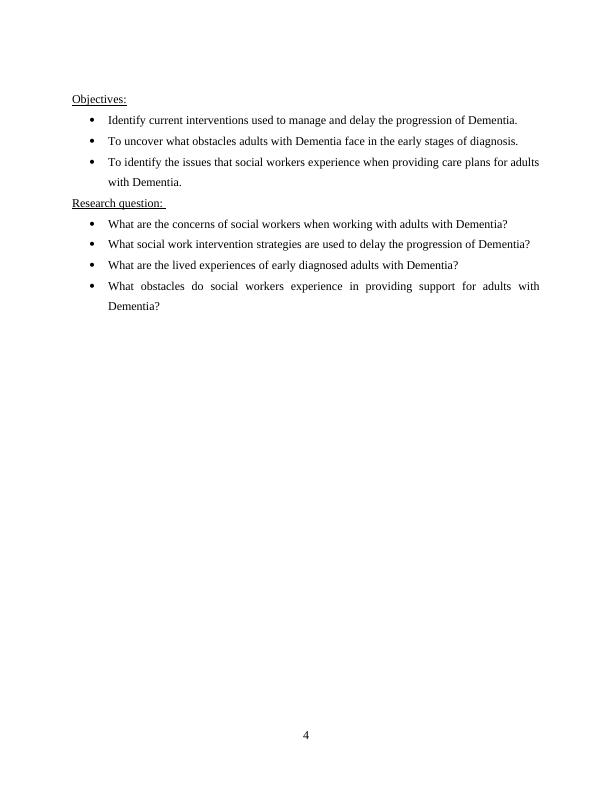
POLICY AND LEGISLATIVE FRAMEWORK
Dementia is one of the growing concern and is been faced by huge number of ageing
population. Past studies claim that although there are methods that can be used to prevent
cognitive decline, there is no cure or treatment for dementia. However, recent studies provide an
alternative to conventional medicines and coping techniques, such as psychotherapy to manage
and even reverse the effects of the disease. There are various legal frameworks that have been
implemented by UK parliament in order to provide protection to those people who have been
suffering from dementia. It has been analysed that government policies and legislations are being
amended in order to protect patients who are been suffering from dementia. The policy and
legislative framework includes the following:
New Liberty Protection Safeguards (LPS): The new law seeks to protect the liberty of
people who do not have the mental capacity to make decisions about their care. In this acute care
will be provided to those who are been suffering from any type of mental disease. In this the
mental capacity amendment has become law (Alghrani, Case and Fanning, 2016). The
government has ensured that in order to take care of patients with mental health issues they have
proper and adequate skills so that this can enhance their health outcome and also improvises their
well-being. In this act the code of practice has been developed by social workers. In this the
mental NHS providers and local government is also been involved. In this the workers are being
involved in making sure that justice is been provided to those dementia patients who have faced
abuse either physical, emotional or sexual. Policies are also being made related to protect
patients facing mental illness and also protecting them from abuse. Skills for care program is also
been implemented so that better services can be provided by LPS workers. In this law fair access
to health care services will be provided to all patients in order to enhance their mental health
capacity. This will also assist them in enhancing health outcome of patient. In this social workers
will be trained at their best so that adequate training can be provided to those who are in need
(George and Gilbert, 2018). People who are been living with mental health illness are provided
with better protection in order to save themselves from any type of abuse. They will also be
assessed with better treatment in hospitals and holistic approaches will be used by social workers
in order to enhance health outcome of patients. The law is being made in order to protect people
suffering from mental health problem such as dementia. In this the social worker will also be
engaged in analysing the needs and demands of patients suffering from mental health problems
5
Dementia is one of the growing concern and is been faced by huge number of ageing
population. Past studies claim that although there are methods that can be used to prevent
cognitive decline, there is no cure or treatment for dementia. However, recent studies provide an
alternative to conventional medicines and coping techniques, such as psychotherapy to manage
and even reverse the effects of the disease. There are various legal frameworks that have been
implemented by UK parliament in order to provide protection to those people who have been
suffering from dementia. It has been analysed that government policies and legislations are being
amended in order to protect patients who are been suffering from dementia. The policy and
legislative framework includes the following:
New Liberty Protection Safeguards (LPS): The new law seeks to protect the liberty of
people who do not have the mental capacity to make decisions about their care. In this acute care
will be provided to those who are been suffering from any type of mental disease. In this the
mental capacity amendment has become law (Alghrani, Case and Fanning, 2016). The
government has ensured that in order to take care of patients with mental health issues they have
proper and adequate skills so that this can enhance their health outcome and also improvises their
well-being. In this act the code of practice has been developed by social workers. In this the
mental NHS providers and local government is also been involved. In this the workers are being
involved in making sure that justice is been provided to those dementia patients who have faced
abuse either physical, emotional or sexual. Policies are also being made related to protect
patients facing mental illness and also protecting them from abuse. Skills for care program is also
been implemented so that better services can be provided by LPS workers. In this law fair access
to health care services will be provided to all patients in order to enhance their mental health
capacity. This will also assist them in enhancing health outcome of patient. In this social workers
will be trained at their best so that adequate training can be provided to those who are in need
(George and Gilbert, 2018). People who are been living with mental health illness are provided
with better protection in order to save themselves from any type of abuse. They will also be
assessed with better treatment in hospitals and holistic approaches will be used by social workers
in order to enhance health outcome of patients. The law is being made in order to protect people
suffering from mental health problem such as dementia. In this the social worker will also be
engaged in analysing the needs and demands of patients suffering from mental health problems
5
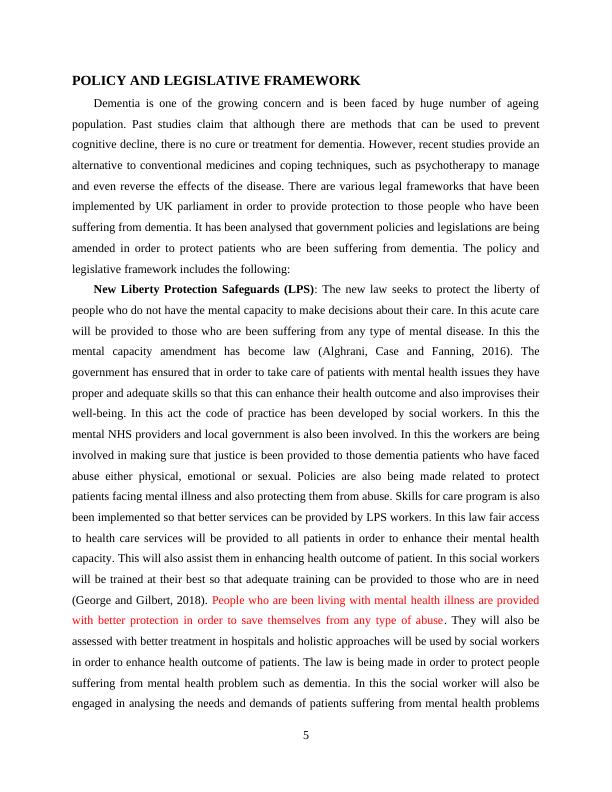
End of preview
Want to access all the pages? Upload your documents or become a member.
Related Documents
Dementia Care: Understanding Needs and Implementing Effective Interventionslg...
|17
|4442
|72
A Critical Analysis of an Episode of Care pdflg...
|14
|3852
|1155
Clinical Judgment and Decision-making in Nursing: A Case Studylg...
|5
|1012
|78
The impact of music therapy on wellbeing of dementia patientslg...
|12
|2931
|182
Mental Health Nursing - PDFlg...
|29
|7775
|171
Introduction to Health and Social Carelg...
|6
|1378
|78
